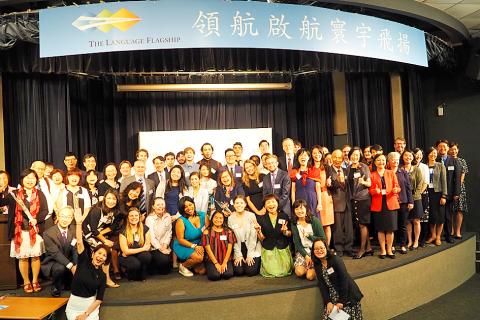The Chinese Overseas Flagship (COF) in Taiwan center, part of the US government-sponsored Language Flagship program, officially opened yesterday at National Taiwan University (NTU) in Taipei.
The Language Flagship is an undergraduate program that includes instruction in languages such as Arabic, Korean, Persian, Portuguese, Russian and Turkish under the US’ National Security Education Program (NSEP).
The NSEP was established in 1991 under the David L. Boren National Security Education Act that mandated the US secretary of defense to create such a program to provide scholarships for undergraduates, fellowships to graduate students and grants to US institutions to fund the study of countries and languages critical to the US’ national security.

Photo courtesy of the Ministry of Education
The COF in Taiwan center, which was established on June 3 and received its first batch of students last month, is one of two such centers in Asia; the other is at Nanjing University in China.
There had been one at Beijing Union University for several years, but the COF headquarters in the US is no longer using it for the capstone portion of the program, in which students who have completed four years of Chinese-language undergraduate courses take classes and intern in professional environments.
The Taipei center has 22 US students who have received scholarships of more than US$10,000 a year to study in Taiwan, center director Chao Der-lin (趙德麟) said at the opening ceremony.
Chao is a professor and head of the Chinese division at Hunter College in New York City as well as the director of that school’s Chinese Flagship center.
Hunter is one of the 12 universities that comprise the domestic Chinese Flagship in partnership with the US Department of Defense, and it has partnered with NTU to run the Taipei facility.
Aside from studying language and subjects related to their field of interest at NTU, the students will be able to intern at Taiwanese businesses and organizations, NTU said.
In a speech at the opening ceremony, American Institute in Taiwan Director Brent Christensen said that Taiwan is a good place to learn Chinese due to its safe environment, hospitable people and diverse culture.
Christensen encouraged the students to make the most out of their 10-month stay in Taiwan, saying that what he learned in Taiwan on his first overseas diplomatic assignment has helped his career.
Deputy Minister of Foreign Affairs Hsu Szu-chien (徐斯儉) said that the COF Taiwan Center is a milestone of US-Taiwan educational cooperation that symbolized strong Taiwan-US relations.
NTU already has a storied reputation for running intensive Mandarin language-training programs. Stanford University established a Mandarin training center on NTU’s campus in 1961, which two years later became the Inter-University Program (IUP) and over the next three decades set the standard for instruction in modern and classical Chinese.
In 1997, the US universities involved in the IUP moved the program to Tsinghua University in Beijing, while NTU assumed full administration for continuing the program on its campus, which it renamed the International Chinese Language Program.

The CIA has a message for Chinese government officials worried about their place in Chinese President Xi Jinping’s (習近平) government: Come work with us. The agency released two Mandarin-language videos on social media on Thursday inviting disgruntled officials to contact the CIA. The recruitment videos posted on YouTube and X racked up more than 5 million views combined in their first day. The outreach comes as CIA Director John Ratcliffe has vowed to boost the agency’s use of intelligence from human sources and its focus on China, which has recently targeted US officials with its own espionage operations. The videos are “aimed at

STEADFAST FRIEND: The bills encourage increased Taiwan-US engagement and address China’s distortion of UN Resolution 2758 to isolate Taiwan internationally The Presidential Office yesterday thanked the US House of Representatives for unanimously passing two Taiwan-related bills highlighting its solid support for Taiwan’s democracy and global participation, and for deepening bilateral relations. One of the bills, the Taiwan Assurance Implementation Act, requires the US Department of State to periodically review its guidelines for engagement with Taiwan, and report to the US Congress on the guidelines and plans to lift self-imposed limitations on US-Taiwan engagement. The other bill is the Taiwan International Solidarity Act, which clarifies that UN Resolution 2758 does not address the issue of the representation of Taiwan or its people in

US Indo-Pacific Commander Admiral Samuel Paparo on Friday expressed concern over the rate at which China is diversifying its military exercises, the Financial Times (FT) reported on Saturday. “The rates of change on the depth and breadth of their exercises is the one non-linear effect that I’ve seen in the last year that wakes me up at night or keeps me up at night,” Paparo was quoted by FT as saying while attending the annual Sedona Forum at the McCain Institute in Arizona. Paparo also expressed concern over the speed with which China was expanding its military. While the US

SHIFT: Taiwan’s better-than-expected first-quarter GDP and signs of weakness in the US have driven global capital back to emerging markets, the central bank head said The central bank yesterday blamed market speculation for the steep rise in the local currency, and urged exporters and financial institutions to stay calm and stop panic sell-offs to avoid hurting their own profitability. The nation’s top monetary policymaker said that it would step in, if necessary, to maintain order and stability in the foreign exchange market. The remarks came as the NT dollar yesterday closed up NT$0.919 to NT$30.145 against the US dollar in Taipei trading, after rising as high as NT$29.59 in intraday trading. The local currency has surged 5.85 percent against the greenback over the past two sessions, central